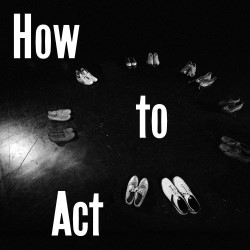How To Act opens with a bold premise: theatre is dying. In the face of stiff competition from bigger budget, always-on entertainment, theatre is struggling to justify its existence. Young actress Promise welcomes us to a masterclass from renowned theatre practitioner Anthony Nicholl, at which he promises to help her – and us – to discover the truth that makes theatre important.
Whether or not you’ve been to a theatre masterclass, Robert Goodale’s Nicholl is delightfully self-important. A walking theatre cliché (he instantly takes his shoes off, for example) and oozing earnest pretension, the character is nonetheless curiously compelling. Graham Eatough’s script is funny and sharp and you’re quickly drawn into the story, despite a potentially lofty premise.
Jade Ogugua’s Promise is wonderfully watchable. She radiates warmth and humility from her opening introduction of the great man, but she retains a guarded quality that’s intriguing. She’s a girl with a secret and we’re torn between wanting to know it and wanting Nicholl to respect it and her and let it remain as hers alone.
Eatough also directs this National Theatre of Scotland production and makes his audience work throughout the hour-long show. Inspired by Greek tragic drama, this play explores seemingly incompatible ideas of truth and the human consequences of this conflict. Using the West’s relationship with other nations on whom we rely for our own resources (oil-rich Nigeria, in this case) as a clever parallel, he forces us to question our assumptions about people whom we too readily assume are somehow “other” and therefore different to us.
A piece of theatre about the nature of theatre is a brave undertaking, particularly when Eatough also wants us to question our smug Western complacency and the legacy of colonialism. His direction is expert, wringing out both the pathos and the rage of the two characters, lost in their own stories and confronted with versions of their truth that just won’t compute. The acting is compelling and assured. Lights, music and staging are just as imaginative as they need to be – look out for Promise’s map of the Niger Delta.
But does Eatough answer his own question? Theatre should present truth, he posits. Nicholl is left cowering in the face of an unpalatable truth, but is it a truth or has he – and have we – just been “master-classed”? The actors strive for truth but they’re presenting someone else’s words. So what’s truth in that context? This is a tangled, complex piece that’s both a fun and gripping hour of theatre and a knotty intellectual challenge. It’ll lurk in your head if you let it.
